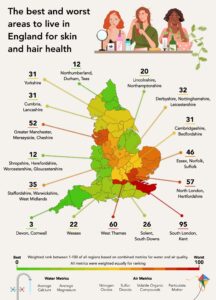The unfair stereotypes Brits make based on first names

New research has revealed that Brits are quick to judge a person’s personality based on their first name, and usually get it wrong. People called James are thought to be the most charismatic and confident, and women named Gemma assumed to be bad tempered and unkind.
Commissioned by My Nametags, a manufacturer of durable sticker and iron-on name labels, a survey of 2,000 adults, focussed on six of the most common names in the UK: David, James, Christopher, Sarah, Laura and Gemma, with the aim of finding out once and for all what stereotypes exist around the names, whether they ring true and if it is really possible to ‘act like a Sarah’.
Women with the name Sarah are often considered in a good light, as research revealed that Sarahs are usually thought to be compassionate, sociable, kind, conscientious and likable.
It’s bad news for those named David, with most Brits admitting to expecting people with this first name to be assertive, angry and closed-minded, even before meeting them.
The research revealed that men with the name Christopher are considered to be the most intellectual of all, found to be quiet, high-achieving, reliable and organised. However, it’s not all a bed of roses for those named Christopher as they are also assumed to be unsociable and uninventive.
Lauras also don’t fare well, according to the stereotypes. The research revealed that women named Laura are thought to be unlikeable, uncharismatic and bad team-players. However, what they lack in social skills they make up for in energy and creativity, or so we think.
Chartered Clinical Psychologist and Scientist, Linda Blair, explains why these stereotypes exist: “One of the ways we deal with information overload, a real problem in today’s world, is to create mental ‘shortcuts’ and relying on name stereotypes is one of them. However, these stereotypes are usually based on only a few high-profile individuals at a particular point in time and, even less realistically, often on fictional characters in books and films. As a result, they rarely hold up in everyday encounters. Add this to the fact that each of us displays different, often contradictory qualities, depending on the situation, and you’ll find those stereotypes bear little relation to the people you meet.”
To test this theory, My Nametags teamed up with Linda Blair to conduct a series of psychological assessments devised to reveal an individual’s most dominant personality traits, on a test group of people with these six common names, to determine whether they really did live up to the stereotypes. Using ‘The Big Five’ personality types, which are the five broad categories used by psychologists to define human personalities, the blind trial asked each of the subjects to describe themselves from their own point of view, as well as from their friends, family and colleagues’ point of view, to give a holistic perspective of their character. The results showed that in many instances, the stereotypes proved to be entirely wrong. Surprisingly, given how strong the stereotypes are, only around 30 percent of people tested displayed the characteristics that we expected them to have. For example, research suggested that individuals called Sarah and James were likely to be conscientious, yet, when tested, it was only people named Gemma who used this word to describe themselves.
Similarly, the survey suggested those with the names Gemma and James are considered to be the moodiest. However, the experiment found that just a third of people named Gemma and James would identify themselves as moody, with an equal amount of Lauras and Christophers admitting to being grumpy people.
Linda Blair comments on the findings: “The tests revealed that most people have a range of conflicting personality traits, offering a potential explanation as to why so few people lived up to their stereotypes. For instance, during interviews, one Sarah described herself and both organised and disorganised, depending on the situation. This makes it incredibly difficult to categorise individuals into a broad stereotype, especially based on their first name alone.
“These contrasting qualities are likely to present themselves to different people in different situations, so there is no single list of qualities that could be used to describe any one of these accurately. For this reason, I would suggest that it isn’t possible for someone to ‘act like a James’ and we shouldn’t be tempted to make judgements about people based purely on their name because we will almost certainly be wrong.”




